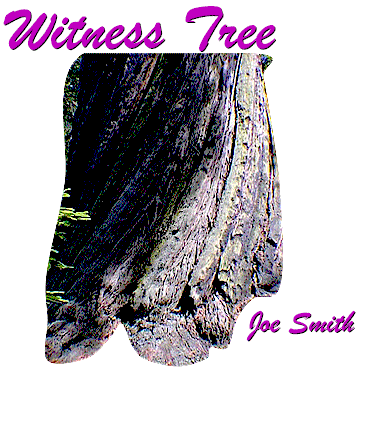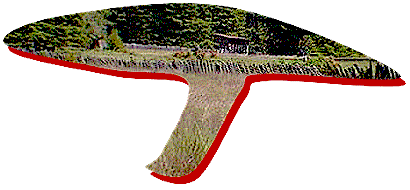


|
||
| Bull Story | ||
| My neighbor Hank's cow pasture slopes gently down towards the sea, then suddenly stops, about a hundred feet above the waves and backwash churning below. The cliffs are sheer, but in a few spots it's possible for the daring and nimble to make their way down to the water. One such place is the cove where people used to dump junk. A dandy source of polished bottle shards, sea-beaten spark plugs, brass buttons off old Can't Bust'em overalls, truck carcasses and such, the tiny cove lies in the lee of a spit of crumbly land locals have dubbed Tsunami Point. | ||
| This westernmost gob of earth, with its commanding view, is where locals gather to watch tidal waves roll in any time the National Weather Service issues a tsunami warning. We also gather there in November, full of envy, to watch gray whales headed south for watery idylls and honeymoons in the tropical seas off Baja. November is the cruelest month on the North Coast, bringing melancholy hints of the winter storms which will shred our patchwork roofs, stirring memories of the bitter smell of our last candles guttering out, leaving us in utter darkness during the frequent, and lengthy, power outages. | ||
| In February, when the worst of winter is usually over, and we spy the happy, happy whales nosing northward, the first narcissus puts in an appearance. Eventually the white flowers will be everywhere, but the first are always in Hank's cow pasture. Come April, it boasts the yellowest daffodils, followed shortly by the silkiest, sexiest riot of Douglas iris, gone all crazy with black and lavender. | ||
| The cows are responsible for the shameless display. In addition to producing a thousand gallons of milk every year, a good Guernsey will also drop fourteen tons of dung. My source for the latter figure, a handbook of animal husbandry, doesn't mention who collected the data, or exactly how, but I assume it means wet tons rather than dry tons, if you catch my drift. Fourteen of them may strike you as a lot, but if you're wearing vibram-sole boots, check the bottoms after a stroll through Hank's pasture, and the figure will seem quite realistic. And that's not counting the patties you saw and didn't step in, each fresh pattie weighing in at, say, a pound a plop. Believe me, you'll wish you'd been shod in slick-sole, narrow-toe cowboy boots. | ||
|
||
| Hank is wearing them, mumbling to himself when I happen across him out among the cows in the pasture one unseasonably warm morning. Never played hide and seek before, not at feed time, that one, he croaks, in a voice stubbly as his beard. | ||
| His prize yearling bull is missing. Mighty obliged for the help I offer in finding the prodigal bovine, Hank pats the rump of a sloe-eyed heifer and we head off, at his suggestion, in different directions. | ||
| Half an hour later we meet again, near a few ancient tire tracks left by cars pushed over the cliff in bygone days. His blue healers lie in the grass, panting, while we stand there, stumped, chewing over possibilities. Daylight cattle rustling, spontaneous combustion, abduction by aliens. We scratch our chins and peer out over the water, as if we expected to see a pirate ship sailing away. What we actually do see is almost more unlikely -- the prize bull, calmly grazing in the shade of a scrub oak on a low islet about fifty yards off Tsunami Point. | ||
| We clamber down to the cove, the former dump, climb on a Chevy rusting into the gray wacky at the water's edge, and shout at the bull. He hears us. He hears the barking dogs. He raises his head, stares at us. Bulls are fairly decent swimmers, as anyone who's watched them fording rivers in low-budget Westerns can attest. He could easily make it to shore. He made it to the island, didn't he? But bulls are also fairly stubborn. He gives a Come and get me if you want me snort, turns his hindquarters to us, and resumes chomping the islet's salty hors d'oeuvres. | ||
| Feeling his oats, he is, says Hank. He nods to the heelers, who've been racing back and forth, scrabbling over the pebbles and polished bits of glass. Go fetch him, he orders. Fetch the booger on home. | ||
| The dogs plunge into the surf, paddle madly, yelp, and swim back to shore. Even on our warmest days, the sea is freezing. If it wasn't sloshing about, it would probably be ice. The dogs shake themselves and lie down on some rocks in the sun to whimper. | ||
| I suggest we wait. Sooner or later the bull is bound to come on his own. Hank's worried the bull might get swiped off the rocks by a sneaker wave in the meantime, like those tourists we're always reading about in the paper, get himself caught in a rip-tide and be sucked out to sea. He figures we'd best find ourselves a boat. | ||
| From the cliffs comes a rattle of falling stones. A woman is climbing gingerly down to the shore, in search of pretty bits of sea-worn glass, to judge by the plastic bag she's carrying. Her curiosity is aroused by the sight of the bull on the island, and Hank fills her in on the story. | ||
| A yearling bull, she says, mulling over the situation. Why don't you go find his mother? | ||
| We do, leading her down by a much longer but less steep path, through peppery nasturtiums and sweet pea vines, past blooming butterfly bush and wild roses rambling along the rafters of a fallen barn. She seems to be enjoying her foray outside the fences, until she spots her truant son. | ||
| At first he pays no heed to her bellowing. He pretends to be deaf. As her lowing becomes more frantic, though, more scolding, he finally lets out the closest thing to a defeated sigh I've ever heard from a bull, steps into the rolling waves, and, nose held high above the water, snuffling, beats a foamy retreat back to the beach. His mother nuzzles him when he scrambles ashore. Her brown eyes, deep, wet, glossy, give me the strange sensation that some part of her feels sorry for him, for a doused flame, some spark he's just lost. | ||
| Now why didn't we think of that? asks Hank. | ||
| Because we're obviously not mothers, I answer, feeling sort of ashamed about explaining such a simple thing to a man nearly ninety, who's going to be out in the hot sun all afternoon checking his fences to see where they need mending. | ||
|